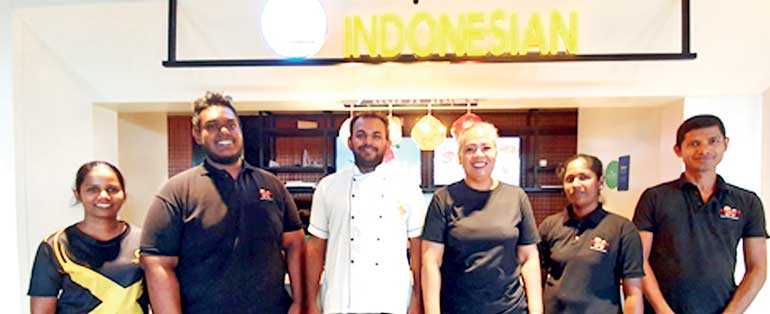Monday Feb 16, 2026
Monday Feb 16, 2026
Saturday, 19 October 2019 00:08 - - {{hitsCtrl.values.hits}}


Text and Pix by Madushka Balasuriya
Indonesian food maybe gradually growing in popularity in Colombo, but more often than not the original is always the best, and so it proves to be true with Sumatran Spice – the Indonesian restaurant that kicked off Colombo’s budding love affair with this most flavour-rich of Asian cuisines.
From its humble beginnings at the weekend Good Market in Colombo nearly a decade ago, to opening up its first flagship store on Vauxhall Street, and to now having its own outlet at the Colombo City Centre Food Studio, Sumatran Spice has gone from strength to strength in recent years.
Spearheading this growth has been the steady hand of home cook Nani De Silva. Nani, who is of Indonesian descent but has called Sri Lanka home for the past 35 years having married a Sri Lankan, says she had been a home cook for many years before deciding to try her hand at the restaurant business.
“It just started off as a hobby, because the children had grown up and I realised that no one knew anything about Indonesian food in Colombo at the time,” she tells Daily FT, about her inspiration to start a restaurant.
“Then in a matter of months the customers really started getting the taste for it, and some of them asked why we hadn’t opened a restaurant, so we did – at Vauxhall Street.”
Personal touch
Throughout this transition, the one hallmark of Sumatran Spice has been its consistency in quality – something which owes a great deal to the personal touch Nani puts into her food.
Everything is unsurprisingly made from scratch. Even the peanut sauce is made using freshly-roasted peanuts.
While some key ingredients are brought down from Indonesia, others can’t be found in Sri Lanka so Nani has spent countless hours identifying suitably local substitutes. This is so that she can at all times use the freshest local ingredients.
“We don’t use any peanut butter or anything. Over time I have found local ingredients that manage to bring out the same flavour, but there are some which I have to bring down from Indonesia. One such thing is the sweet soya sauce, which you can’t find here.”
And that sweet soya sauce is absolutely worth it, considering it is the core ingredient in two of Nani’s most popular dishes – the Nasi Goreng and the Mee Goreng.
With a small team of eight behind her, Nani keeps the menu relatively small, focusing her time and energy on a select few dishes. This, while possibly lacking the sheer variety of larger establishments, makes up for in quality, as Nani is able to overlook in person everything in the kitchen – something that even extends to Sumatran Spice’s outdoor catering service.
“I still like to go and prepare the dishes in people’s houses personally. If somebody requests I will go personally. With food you have to do it personally if you want to maintain the quality.”
Value for money
On to the small matter of the review, what struck my dining colleague and me the most when we sat down to eat was the sheer quantity of food on offer. With dishes ranging in price from Rs. 800 to Rs. 1,200, this certainly won’t break the bank, but once you realise that most dishes can feed at least two people, the value proposition really begins to stack up. Of what we tried out, the standout was undoubtedly the Chicken Nasi Goreng (Rs. 850). A good ‘Nasi’ has long been a favourite for Sri Lankans, and this one really hits the spot. The flavour of the meat is evenly spread through the rice, which itself retains an ideal amount of moisture that manages to consistently entice you have just one more bite.
Next on the list are the Chicken Satays (Rs. 800), which serves up four generously-portioned skewers. The meat was delicately cooked, crispy on the outside, tender in the middle, but the starring role cannot go to anything other than the positively delectable peanut sauce - so good that Nani quite literally plans on bottling it and selling it.
The final dish we’re going to mention is the Chicken Opor (Rs. 900). While the delicious Beef Rendang ran close, the Opor’s succulent, falling-off-the-bone meat simply stole the show.
“We slow cook it for several hours,” explained Nani, when asked about the process of making it.
And it’s that care and attention to detail which really sets Sumatran Spice apart. Even the accompanying sambols – the one made with kochi miris was particularly potent – have been made fresh. All this amounts to a true bang-for-your-buck experience. Indonesian cuisine is meant to be a familial experience, influenced by some 300 ethnic groups, so bring your friends, order plenty, and share to your heart’s content!